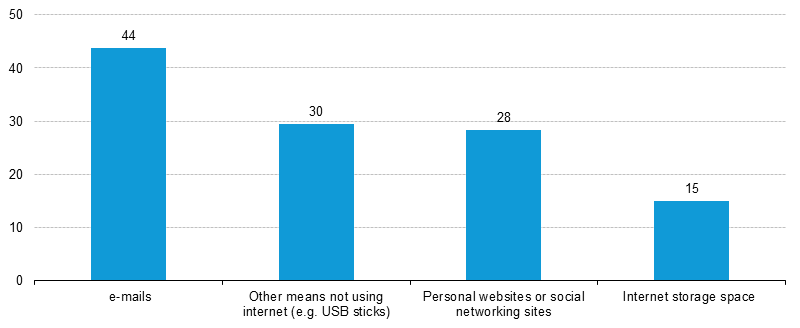Across The Atlantic, Glimpse An Alternate Internet Universe
http://www.npr.org/sections/money/2014/04/09/301028037/across-the-atlantic-glimpse-an-alternate-internet-universe
a moment when the U.S. decided to go one way and the rest of the world went another
+++++++++++++++++
more on Internet Access in this IMS blog
https://blog.stcloudstate.edu/ims?s=internet+access
two articles of interest regarding freedom of speech on the Internet





New heights in digital activism
As governments around the world impose new restrictions on internet freedom, it is worth remembering what is at stake. The present crackdown comes as digital platforms are being used in new and creative ways to advocate for change and, in many cases, save lives. Internet advocacy had real-world results in both democracies and authoritarian settings over the past year, and its impact was often most pronounced in countries where the information environment was more open online than off. In over two-thirds of the countries examined in this study, there was at least one significant example of individuals producing a tangible outcome by using online tools to fight for internet freedom, demand political accountability, advance women’s rights, support victims of unjust prosecution, or provide relief to those affected by natural disasters.
Fighting for internet freedom and digital rights
Social media were used effectively to fight for internet freedom in a variety of countries over the past year. In Thailand, over 150,000 people signed a Change.org petition against a government plan to centralize the country’s internet gateways, which would strengthen the authorities’ ability to monitor and censor online activity. As a result, the government announced that it had scrapped the plan, though skeptical internet users remain vigilant.
Using the hashtag #NoToSocialMediaBill, Nigerian digital rights organizations launched a multifaceted campaign to defeat a “Frivolous Petitions Prohibition Bill” that threatened to constrain speech on social media. Alongside significant digital media activism, civil society groups organized a march on the National Assembly, gathered signatures for a petition presented during a public hearing on the bill, and filed a lawsuit at the Federal High Court in Lagos, all of which contributed to the bill’s withdrawal in May 2016. India’s telecommunications regulator banned differential pricing schemes in February after more than a million comments were submitted online to protest companies that charge consumers different prices for select content or applications.
+++++++++++++++++++++
more on Internet freedom in this IMS blog:
https://blog.stcloudstate.edu/ims?s=freedom
https://blog.stcloudstate.edu/ims?s=civil
Save
Internet pioneer dies at 102
https://fcw.com/blogs/fcw-insider/2016/10/beranek-dies-102-darpanet.aspx
Leo Berane, native of Solon, Iowa, passed away Oct. 10 at the age of 10.
The same year that Neil Armstrong first walked on the moon and the Beatles gave their last live performance, the ARPANET was born.
“I never dreamed the internet would come into such widespread use, because the first users of the Arpanet were large mainframe computer owners,” said Beranek in the New York Times interview.
++++++++++++++
more on Internet history in this IMS blog:
https://blog.stcloudstate.edu/ims?s=internet+history
Why Is American Internet So Slow?
Antiquated phone networks and corporate monopolies do not produce fast Internet.
By Rick Paulas
https://psmag.com/why-is-american-internet-so-slow-98f4eeadb371#.q9v3rd42k
AT&T, Comcast, Verizon, and Time Warner have a “natural monopoly” since they’ve simply been at it the longest. While the Telecommunications Act of 1996 attempted to incentivize competition to upset these established businesses, it didn’t take into account the near impossibility of doing so. As Howard Zinn wrote in A People’s History of the United States, the Telecommunications Act of 1996 simply “enabled the handful of corporations dominating the airwaves to expand their power further.”
Chattanooga has somewhat famously installed its own. Santa Monica also has its own fiber network. The reason these communities have been successful is because they don’t look at these networks as a luxury, but as a mode of self sustainability.
The 19th century’s ghost towns exist because the gold ran out. The 21st century’s ghost towns might materialize because the Internet never showed up.
++++++++++++++
more on Internet access in this IMS blog
https://blog.stcloudstate.edu/ims?s=internet+access
Is the U.S. handing over control of the internet?
By Andrew Sullivan Aug 23, 2016
https://fcw.com/articles/2016/08/23/comment-iana-sullivan.aspx
the truth is that on the internet, nobody has control.
omething is about to change — that much is true. Since its founding in 1998, the Internet Corporation for Assigned Names and Numbers (ICANN) has held a contract with the U.S. Commerce Department’s National Telecommunications and Information Administration (NTIA). That contract was for “IANA functions,” which are useful and important functions that allow parts of the internet to work the way they do.
IANA, which stands for Internet Assigned Numbers Authority, is like a land registry for the internet that prevents two different functions from laying claim to the same value at the same time.
For instance, when you visit a web page, you probably use the conventional port 443 for a secure connection. Everyone knows to use port 443 for this purpose (as opposed to, say, port 25, which is for mail) because it’s written down in an IANA registry. It wouldn’t matter which number we used as long as everyone used the same number. If everyone does not, then in order to make a connection you’d first have to negotiate what port to use, and that would be less convenient.
One of the IANA registries is the Domain Name System root zone. It holds the name servers for the top-level domains (such as .com and .org and country codes such as .us, .cn and .in). Ultimately, in the DNS, every response depends on the values in the root zone. This is why the job is a critical function.
The end of oversight by the U.S. government does not mean that ICANN gets to do whatever it wants. Instead, in the past two years, the internet community came together to invent new, community-based ways of ensuring that ICANN does a good job. If it doesn’t, the community can, in effect, fire ICANN. That is the way everything already works on the internet. The idea is to take the existing successful model of the open internet, built by voluntary collaboration, and use it again for that purpose.
The United States is not “giving away” the internet. NTIA is wisely acknowledging that the internet has grown up and that the system works as designed and doesn’t need governments to keep it going. On Oct. 1, nobody will be able to tell that anything has changed. We should all be thankful that NTIA recognizes that its job is complete and that it can step back confident that the same enlightened self-interest that keeps the internet delivering its magic will work for this part of the internet, too.
++++++++++++++++++++++
more on the Internet-related topics in this IMS blog at
https://blog.stcloudstate.edu/ims?s=internet
Internet and cloud services – statistics on the use by individuals. Half of Europeans used the internet on the go and a fifth saved files on internet storage space in 2014
http://ec.europa.eu/eurostat/statistics-explained/index.php/Internet_and_cloud_services_-_statistics_on_the_use_by_individuals
Use of internet and other means for sharing files electronically, EU-28, 2014 (% of individuals)4

802.11AC
http://en.wikipedia.org/wiki/IEEE_802.11ac
Campus Technology Whitepaper
Dear Plamen,
In the mobile era we live in, your students expect more from their institution’s wireless capabilities.
In this informative whitepaper, you’ll learn how deploying the first wireless standard (802.11 AC) where the speed of wireless is faster than a wired connection can empower your institution to meet the growing, technology driven landscape of today’s higher education environment.
My Note: Campuses are gearing up to the challenges of the Millennials and Gen Z. So do, allegedly, the SCSU IT. BOYD is now a term, which (finally, after 3 years of IMS proposing it to CETL) is waved forth and back at the SCSU campus in a lipservice attempt to convince stakeholders and public how much SCSU is with the times.
Once details transpire, however, one can see that 802.11AC allows 1GB connection and for the last 15 years, the SCSU IT never made it transparent (discussion? forget it), when 1 GB LAN will come to the campus. How can SCSU IT wave the BYOD flag, if older and more important issues are not resolved? Even if they are resolved, how does SCSU IT expect faculty to embrace the technology, if it is sold by the IT people? The sound pedagogical approach to new technologies must be done by faculty not by IT folks.
In order for BYOD, for that matter any other technology on campus to work (work means to a very large degree “accepted by educators,” the second most important stakeholder after the students – faculty – must be on board. Are they really on board controlled and dimmed by the SCSU IT?







